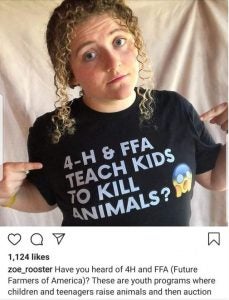In the past month, FFA members have found themselves in the middle of a pressing issue. For many FFA members, they have just witnessed their first attack against something they hold so near and dear to their hearts — the FFA and 4-H programs themselves. While the individual lobbing criticism at the programs does not deserve any more attention, it’s important to recognize that she will not be the last person who FFA members come across who will not share their viewpoints.

This young activist believes that the children and teenagers involved in FFA and 4-H raise animals only to auction them off for slaughter. While anyone involved in these leadership-oriented organizations know that is the furthest thing from the truth, it still puts members in a defensive mode. While that is understandable, how members react to this so-called “activist” (and others like her) is important.
Below are some tips in dealing with someone with an opposite view as you, specifically to FFA and 4-H.
- Never share their content directly. Even if what that person is saying is not true, sharing their content is exactly what they want you to do. In today’s day and age, that is essentially like giving them money. If you need to share the content as reference, simply screen shot it (as we’ve done above). You just fuel their fire with the more views, comments, and shares if there are direct links to their pages.
- Kindness > hatred — NEVER let your emotions get the best of you. There is no need for name calling or death threats, which was sadly the case this time. If facts are on your side, you don’t have to stoop to that level. As organizations that hold their members to a high standard, FFA and 4-H members should always represent their organizations with integrity and respect. FFA members are leaders, not attackers. The agriculture industry as a whole is used to conflicting views, and that is OK — not everyone is going to think like you. However, it is important to maintain respectfulness, even if the other side doesn’t. Actions always speak louder than words.
- On that note, realize that you won’t be able to change everybody’s mind. An open and honest discussion is always ideal, but realize that no matter how many facts you present, not everyone will want to listen to them. As agriculturalist, we have to realize that everyone is entitled to their own opinions. At the same time, don’t give up if you can’t reach that one person. Often times people read the comments without actually commenting — you have no idea how many individuals you are actually reaching.
- Use your platform for good. FFA members today are growing up in a world that previous generations cannot relate to. If Gen Z wants to get a point across, they don’t write a letter, they express themselves online. Put out as much educational information that you can attest to. For example, upload informational Instagram stories, Tiktoks, vlogs — whatever you feel comfortable with. Just remember to stay open minded and real. No one is going to listen if you are rude and condensing.
- Realize your strength in numbers. Like any social media group, use hashtags to your advantage and to find each other. For example, #thisisFFA, #foreverblue, #ageducation or just #FFA. The more good news you can spread, the better.
- Research and realness. Through FFA, members learn so much about their passion, but sometimes it can be hard to convey it to the general public. Listen to the questions they are asking — answer it with personal experience or cite your sources. You have the resources to back up your claims and if you don’t know the answer to something, just reach out — don’t make something up on the spot. When you stay real and honest with people, they will recognize that.
It is tough when someone attacks an organization that we hold so near and dear to our hearts. Both the National FFA Organization and the National 4-H Council have molded so many individuals into the leaders they are today, but we also must realize that not everyone will see eye to eye. Just remember, whatever you do, be compassionate and precise with your wording. We cannot let one person’s opinion change how we react to the world around us.
“The most powerful leadership tool you have is your own personal example.” — John Wooden



